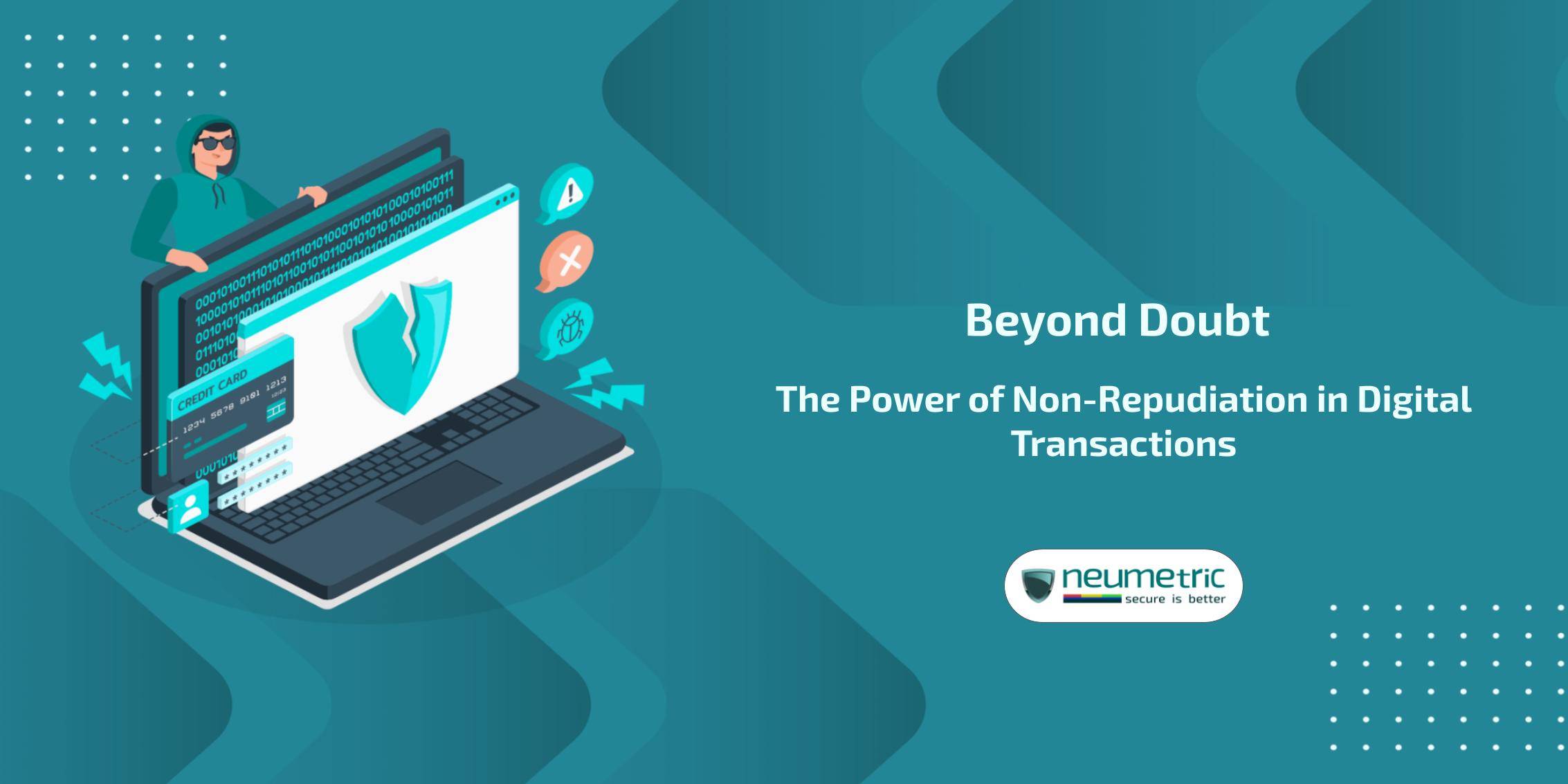Table of Contents
ToggleBeyond Doubt: The Power of Non-Repudiation in Digital Transactions
Introduction
Non-repudiation is a foundational concept in the realm of digital transactions, ensuring that parties involved cannot deny their participation or the authenticity of the transaction. It provides a mechanism to establish accountability and trust in electronic communications by creating evidence that proves the origin, integrity & receipt of data exchanged between parties. Essentially, non-repudiation aims to eliminate disputes by providing undeniable proof of actions taken within a digital environment.
In today’s interconnected world, where a significant portion of transactions occurs digitally, the importance of non-repudiation cannot be overstated. With the rise of e-commerce, online banking & electronic contracts, there is a growing need to ensure the integrity and authenticity of digital communications and transactions. Non-repudiation serves as a fundamental building block of trust in digital interactions, protecting parties from fraud, disputes & repudiation of agreements.
This Journal aims to delve into the intricacies of non-repudiation in digital transactions, exploring its definition, underlying technologies, real-world applications, challenges & solutions. By providing a comprehensive overview of non-repudiation, readers will gain a deeper understanding of its significance in ensuring trust and security in the digital realm. Through discussions on enabling technologies, legal implications & best practices, this journal seeks to equip readers with the knowledge necessary to navigate the complexities of non-repudiation in today’s digital landscape.
Understanding Non-repudiation
Non-repudiation is a foundational concept in digital security, ensuring that parties involved in a transaction cannot deny their involvement or the validity of the transaction. It provides assurance that the originator of a message or action cannot later refute their participation, providing a level of accountability and trust in electronic communications. Non-repudiation mechanisms typically involve the use of cryptographic techniques, such as digital signatures, to create irrefutable evidence of actions taken within a digital environment.
How Non-Repudiation Works in Digital Transactions
Non-repudiation in digital transactions relies on cryptographic methods to create and verify the authenticity of electronic signatures. When a party digitally signs a document or transaction, it generates a unique cryptographic hash that is appended to the document. This hash, along with other relevant information, is then encrypted using the signer’s private key, creating a digital signature. The recipient can then use the signer’s public key to decrypt and verify the signature, ensuring the integrity and non-repudiation of the transaction.
Legal Implications of Non-Repudiation
From a legal standpoint, non-repudiation holds significant importance in validating the authenticity and integrity of digital transactions. Courts and regulatory bodies often recognize digitally signed documents as legally binding evidence, as they provide strong assurance of the parties’ intentions and actions. Non-repudiation mechanisms play a crucial role in mitigating disputes and fraud in electronic transactions, offering a level of assurance and trust that is essential for conducting business in the digital age.
Technologies Enabling Non-Repudiation
Digital Signatures
- How Digital Signatures Work: Digital signatures utilize cryptographic techniques to ensure the authenticity and integrity of digital documents or transactions. They involve the use of public key cryptography, where a sender uses their private key to encrypt a message or document & the recipient uses the sender’s public key to verify the signature’s authenticity. This process provides strong evidence of the signer’s identity and ensures that the document has not been altered since it was signed.
- Advantages of Digital Signatures: Digital signatures offer several advantages over traditional paper-based signatures, including enhanced security, efficiency & convenience. They provide a higher level of assurance compared to handwritten signatures, as they are based on cryptographic algorithms that are extremely difficult to forge or tamper with. Additionally, digital signatures streamline the signing process, eliminating the need for physical documents and enabling faster and more efficient transactions.
Public Key Infrastructure [PKI]
- Role of PKI in Non-Repudiation: Public Key Infrastructure [PKI] plays a crucial role in enabling non-repudiation by providing a framework for managing digital certificates and cryptographic keys. PKI establishes a trusted hierarchy of Certificate Authorities [CAs] that issue digital certificates to entities, verifying their identity and enabling secure communication and transactions. By relying on PKI, parties can verify the authenticity of digital signatures and ensure the integrity and non-repudiation of electronic documents and transactions.
- Components of PKI: PKI consists of several key components, including Certificate Authorities [CAs], Registration Authorities [RAs], Certificate Revocation Lists [CRLs] & digital certificates. CAs are responsible for issuing digital certificates to entities, while RAs facilitate the registration and verification process. CRLs contain a list of revoked certificates, enabling parties to check the validity of digital certificates. Together, these components form the foundation of PKI and enable secure and trusted communication in digital environments.
Blockchain Technology
- Introduction to Blockchain: Blockchain technology is a decentralized, distributed ledger system that records transactions across a network of computers. Each transaction is grouped into a block and linked to the previous block, forming a chain of blocks. Blockchain operates on a consensus mechanism, where transactions are verified and validated by network participants, ensuring transparency and immutability.
- Role of Blockchain in Ensuring Non-Repudiation: Blockchain technology plays a significant role in ensuring non-repudiation by providing a tamper-proof and transparent record of transactions. Once a transaction is recorded on the blockchain, it cannot be altered or deleted, ensuring the integrity and authenticity of the transaction. This immutable record provides strong evidence of the parties’ involvement and actions, enabling non-repudiation in digital transactions.
Real-World Applications of Non-Repudiation
E-Commerce
- Non-Repudiation in Online Purchases: In the realm of e-commerce, non-repudiation is essential for establishing trust between buyers and sellers. Digital signatures and secure payment gateways are often used to ensure the authenticity of online transactions. Non-repudiation mechanisms provide assurance to both parties that the transaction occurred as intended, reducing the risk of disputes or fraud.
- Non-Repudiation Failures: Despite the importance of non-repudiation in e-commerce, there have been instances of failures leading to disputes or fraudulent activities. For example, cases of unauthorized transactions or disputes over the delivery of goods highlight the importance of robust non-repudiation mechanisms to prevent and resolve such issues.
Financial Transactions
- Non-Repudiation in Banking: Banks rely heavily on non-repudiation mechanisms to ensure the security and integrity of financial transactions. Digital signatures, multi-factor authentication [MFA] & transaction logging are commonly used to establish accountability and prevent repudiation of transactions. Non-repudiation is particularly crucial in online banking, where the risk of fraudulent activities is higher.
- Cryptocurrency Transactions and Non-Repudiation: In the realm of cryptocurrency, non-repudiation is a core principle that underpins the integrity of transactions on blockchain networks. The decentralized and immutable nature of blockchain technology ensures that cryptocurrency transactions cannot be altered or repudiated once recorded on the blockchain. This provides a high level of assurance to participants in cryptocurrency transactions, mitigating the risk of fraud or disputes.
Legal Contracts and Agreements
- Non-Repudiation in Digital Contracts: Digital contracts or smart contracts, leverage non-repudiation mechanisms to automate and enforce the terms of agreements in a secure and transparent manner. Digital signatures and blockchain technology are often used to ensure the authenticity and integrity of digital contracts, reducing the need for intermediaries and streamlining the contract execution process.
- Legal Precedents and Non-Repudiation: Legal precedents regarding non-repudiation vary depending on jurisdiction and the specific circumstances of the case. However, courts generally recognize the validity of digitally signed documents and transactions, provided that proper authentication and verification mechanisms are in place. Non-repudiation plays a crucial role in legal disputes, providing concrete evidence of the parties’ intentions and actions in digital contracts and agreements.
Challenges and Solutions
Technical Challenges
- Security Risks and Vulnerabilities: One of the primary technical challenges in implementing non-repudiation mechanisms is the constant threat of security risks and vulnerabilities. Cyberattacks, such as phishing, malware & hacking, pose a significant threat to the integrity and authenticity of digital transactions. Solutions to mitigate these risks include implementing robust encryption protocols, conducting regular security audits & employing multi-factor authentication methods to verify the identity of users.
- Scalability Issues: As digital transactions continue to grow in volume and complexity, scalability becomes a major concern for non-repudiation systems. Traditional cryptographic methods may struggle to scale efficiently to accommodate large numbers of transactions, leading to delays and bottlenecks in the verification process. To address scalability issues, organizations can explore the use of distributed ledger technologies, such as blockchain, which offer a decentralized and scalable framework for recording and verifying transactions.
Legal Challenges
- Jurisdictional Differences: Jurisdictional differences pose a significant challenge to the implementation of non-repudiation mechanisms, particularly in cross-border transactions. Different countries may have varying legal frameworks and regulations governing digital signatures and electronic transactions, leading to confusion and legal uncertainty. To navigate jurisdictional differences, organizations should seek legal advice and ensure compliance with relevant laws and regulations in the jurisdictions where they operate.
- Compliance and Regulatory Hurdles: Compliance with regulatory requirements presents another challenge in ensuring non-repudiation in digital transactions. Regulatory bodies, such as government agencies and industry watchdogs, impose strict requirements regarding the use of digital signatures and encryption methods to ensure the security and integrity of electronic transactions. Organizations must stay abreast of regulatory changes and implement measures to ensure compliance with applicable laws and regulations.
Solutions and Best Practices
- Strengthening Security Measures: To address technical challenges, organizations should prioritize strengthening security measures, including encryption, authentication & access control mechanisms. Employing robust cybersecurity protocols, such as end-to-end encryption and intrusion detection systems [IDS], can help mitigate security risks and vulnerabilities associated with non-repudiation systems.
- Enhancing Legal Frameworks: Enhancing legal frameworks and standardizing regulations can help address jurisdictional differences and regulatory hurdles in implementing non-repudiation mechanisms. Collaborating with industry stakeholders, government agencies & international organizations to develop common standards and guidelines for digital signatures and electronic transactions can provide clarity and consistency in legal requirements across jurisdictions. Additionally, organizations should invest in legal expertise and ensure compliance with relevant laws and regulations to mitigate legal risks associated with non-repudiation.
Conclusion
Non-repudiation serves as the bedrock of trust and integrity in digital transactions. By ensuring that parties cannot deny their involvement or the validity of transactions, non-repudiation provides a robust mechanism to establish accountability and authenticity in electronic communications. It safeguards against disputes, fraud & repudiation of agreements, thereby enhancing confidence in digital interactions and transactions.
As digital transactions become increasingly prevalent across industries, the importance of non-repudiation will continue to grow. While advancements in technology, such as blockchain and encryption, offer promising solutions to enhance the security and integrity of digital transactions, challenges remain in addressing technical, legal & regulatory hurdles. However, with concerted efforts and investments in cybersecurity measures and compliance frameworks, the future of digital transactions holds great promise for fostering a more secure and trustworthy digital ecosystem.
Given the critical role that non-repudiation plays in securing digital transactions, it is imperative for businesses and individuals to prioritize its adoption and implementation. Organizations should invest in robust cybersecurity measures and compliance frameworks to ensure the integrity and authenticity of their digital interactions. Likewise, individuals should educate themselves on the importance of non-repudiation and take proactive steps to protect their digital identities and transactions. By embracing non-repudiation, we can collectively contribute to building a more secure and trustworthy digital environment for all stakeholders involved.
Frequently Asked Questions [FAQ]
What exactly is non-repudiation & why is it important in digital transactions?
Non-repudiation is essentially a way to ensure that parties involved in a digital transaction cannot deny their participation or the validity of the transaction. It’s like having a digital paper trail that proves who did what and when. This is crucial in the digital world because it helps establish trust and accountability, reducing the risk of disputes and fraud.
How do digital signatures work & how do they contribute to non-repudiation?
Digital signatures use cryptographic techniques to create a unique “stamp” on a digital document or transaction. It’s like signing a contract with a unique pen that only you have. This digital stamp ensures that the document or transaction cannot be altered and provides evidence of the signer’s identity, thus contributing to non-repudiation.
What are some of the challenges organizations face in implementing non-repudiation mechanisms & how can they address them?
Implementing non-repudiation mechanisms comes with its set of challenges, such as security risks, scalability issues & legal complexities. These challenges can be mitigated by investing in robust cybersecurity measures, exploring emerging technologies like blockchain & staying updated with relevant legal and regulatory requirements. It’s all about finding the right balance between security, usability & compliance.





